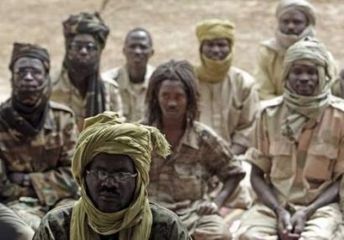Darfur rebel leader Khalil Ibrahim killed “en route to South Sudan”
December 25, 2011 (KHARTOUM) – The leader of the Darfur rebel group Justice and Equality Movement (JEM), Khalil Ibrahim, has been killed as he was leading his forces on the way to the Republic of South Sudan, according to the Sudanese Armed Forces (SAF).

News of his death, which was announced at a late hour on Saturday by SAF’s official spokesman Al-Sawarmi Saad, came in the heels of reports that he was injured in clashes between SAF and his forces in North Kordofan State.
JEM’s forces launched in the last two days a string of attacks on remote areas largely devoid of regular forces along the borders between north Darfur state and north Kordofan state.
According to North Darfur’s governor Osman Kibir, JEM’s forces led by Khalil himself attacked around 20 villages in these areas and carried out extensive pillaging and killing of citizens.
Similarly, North Darfur’s governor Mu’tasim Mirghani told Sudan national TV that Khalil’s forces attacked Arman area, the epicenter of gold-mining activities, and destroyed telecommunication towers. He added that the paramilitary Popular Defense Forces repulsed the assailants and managed to destroy four vehicles.
Gibreel Adam Bilal, JEM’s spokesman, told Sudan Tribune earlier on Thursday that their forces had arrived in north Kordofan state and were on their way to the capital Khartoum in a bid to topple the government. However, he denied allegations of killing civilians.
JEM’s claim of marching on Khartoum called to memory the daring attack they staged on May 11, 2008 on the Sudanese capital.
In a statement carried out on Sunday by SUNA, Sudan’s official news agency, SAF announced that its forces had managed in a “heroic operation” to kill Khalil and a number of his comrades after intensive reconnaissance that led to besieging him and his forces in Wad Banda locality in North Kordofan.
The statement alleged that Khalil and his group were heading towards South Sudan in order to reorganize their troops.
The Sudanese government has long accused the government of South Sudan of supporting and providing sanctuary to Darfur rebel groups. South Sudan, which seceded from Sudan in July, denies the charge.
Speaking on Sunday morning to the subtly pro-government Al-Shorog channel, SAF’s spokesman said that they were “100 percent certain” that Khalil Ibrahim was killed. He further said that their forces were still hunting the fleeing forces of JEM.
Ibrahim’s death, which represents a major blow to the rebel group he founded and led since 2003, came less than five month since he returned to Darfur from Libya where was living in exile from May 2010.
He was forced to stay in Libya after his group boycotted peace talks with the Sudanese government in Doha and his erstwhile ally, Chadian President Idris Deby, turned his back on him following a thaw in long-strained ties between Khartoum and Ndjamena.
Following his return, JEM in late November forged an alliance dubbed the Sudanese Revolutionary Front (SRF) with two factions of the Sudan Liberation Movement (SLM) mainly operating in Darfur, plus the Sudan people’s Liberation Movement-North (SPLM-N) which is fighting in the Blue Nile and South Kordofan. The allied groups vowed to topple the government of president Al-Bashir.
Ibrahim belongs to Al-Zagawa ethnic group, and was a former member of the ruling National Islamic Front (NIF) before he decided to side with the ousted NIF’s leader Hassan Al-Turabi in the 1999 internal power struggle that pitted him against president Al-Bashir and his ex-acolytes in the NIF.
Ibrahim’s group has often been linked to Al-Turabi and the Islamic ideology, but this alleged link was neither admitted by JEM nor by Al-Turabi’s Popular Congress Party.
Under Ibrahim’s leadership, JEM was regarded as the most organized and heavily armed Darfur rebel group.
Darfur conflict erupted in 2003 after ethnic rebel groups accused the government of marginalizing the region. According to UN estimates, 300,000 people died and 2.7 million lost their home as a result of the conflict.
(ST)
